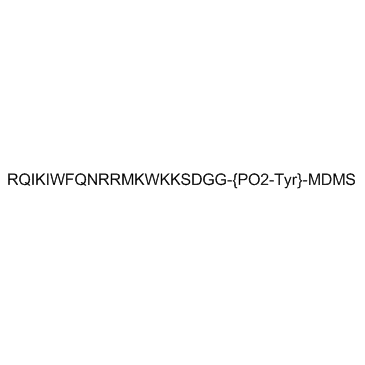740 Y-P
Modify Date: 2024-01-08 18:50:40

740 Y-P structure
|
Common Name | 740 Y-P | ||
|---|---|---|---|---|
| CAS Number | 1236188-16-1 | Molecular Weight | 3270.7 | |
| Density | 1.5±0.1 g/cm3 | Boiling Point | N/A | |
| Molecular Formula | C141H222N43O39PS3 | Melting Point | N/A | |
| MSDS | N/A | Flash Point | N/A | |
Use of 740 Y-P740 Y-P (PDGFR 740Y-P) is a potent and cell permeable PI3K activator. |
| Name | 740 Y-P |
|---|
| Description | 740 Y-P (PDGFR 740Y-P) is a potent and cell permeable PI3K activator. |
|---|---|
| Related Catalog | |
| Target |
PI3K |
| In Vitro | 740 Y-P is a synthetic biotinylated peptide consisting of the 16-amino acid sequence derived from the third helix of the Antennapedia protein in tandem with a 9 amino acid phosphopeptide mimetic of the high affinity p85 binding site on the PDGF receptor. 740 Y-P readily binds GST fusion proteins containing both the N- and C- terminal SH2 domains of p85. 740 Y-P fails to bind GST alone, or a GST fusion protein containing the N- terminal SH2 domain of PLCg and shows relatively weak binding of a GST fusion proteins containing the SH2 domain of Grb2. The 740 Y-P peptide is also able to specifically interact with p85 in cell lysates as shown by affinity precipitation. 740 Y-P stimulates mitogenesis at the lowest concentration tested (1 mg/mL). The peptide stimulates mitogenesis in both the presence and absence of serum (0.5%), and in the former instance a maximal response observed at 50 mg/mL. 740Y-P peptide to stimulate mitogenesis is highly specific and not a general feature of a cell permeable SH2 domain binding peptides[1]. |
| In Vivo | 740 Y-P is not only internalised in living cells but can also interact with p85 in vivo.[1] |
| Cell Assay | Following serum starvation, C2 cells are cultured in the presence of the PDGFR 740Y-P peptide at the given concentrations (0, 1, 10, 100 μg/mL) for 48 h. The mitogenic response is assessed by measurement of the percentage of cells in S-phase[1]. |
| References |
[1]. Derossi D, et al. Stimulation of mitogenesis by a cell-permeable PI 3-kinase binding peptide. |
| Density | 1.5±0.1 g/cm3 |
|---|---|
| Molecular Formula | C141H222N43O39PS3 |
| Molecular Weight | 3270.7 |
| Exact Mass | 3268.561035 |
| LogP | -6.32 |
| Index of Refraction | 1.679 |
| Storage condition | -20°C |

